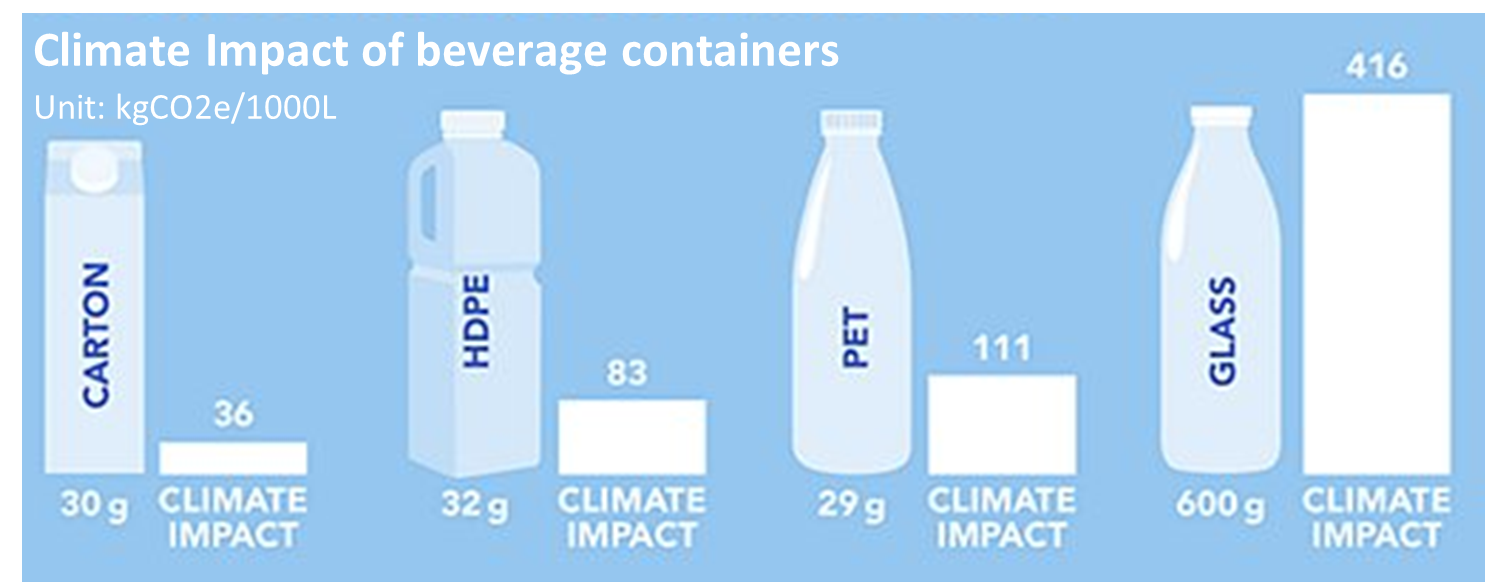Why Sustainable Beverage Packaging Matters for WhatIF Foods
Pond Foundation (PF) member, WhatIF Foods is a planet-based food company based in Singapore founded on regenerative principles. PF, strategic sustainability action advisors, work closely with WhatIF Foods to maximize sustainable and ethical practices in their value chain as they grow.
In accordance with its regenerative approach, WhatIF Foods chose to package its flagship product, BAMNUT Milk, in Tetra Pak® cartons. For a globalized food company selling beverage products, there exists several popular choices for packaging, including glass bottles, plastic bottles, aluminum cans, or Tetra Pak® cartons.
This document aims to justify their choice of packaging from a sustainable beverage packaging perspective.
Summary
Tetra Pak® cartons have been found to have the lowest carbon footprint and best average sustainability metrics of all packaging systems for beverage products¹.

This is due to a combination of factors: their light weight, the low impact of paperboard, and the partial carbon sequestration from paperboard during tree growth.
For a single 1L beverage, Tetra Pak® cartons are 20x lighter than their glass counterparts and use 14x less plastic than their PET counterparts. This means that both glass and PET containers are far more energy intensive per beverage, and that glass containers create more emissions in the transportation of packaging and final beverages.
Addressing Recyclability Concerns
While Tetra Pak® cartons are theoretically fully recyclable, they tend to be less commonly recycled than glass or aluminum cans³, but regardless of whether cartons are recycled or end up in landfill, their carbon footprint remains the lowest of all sustainable beverage packaging. We must also consider that glass beverage containers, deemed most recyclable, face environmental and social issues with sand sourcing, risk of breaking, cost, weight, and hygiene. Even if a bottle is recycled up to 30 times (unlikely), its lifecycle emissions remain equal to or higher than that of Tetra Pak®, due to the repeated emission-intensive steps in recycled bottles⁵. The more 'single-use' nature of the Tetra Pak is concerning in terms of the all-around sustainability of the product, but it appears that it is still the best option.
Looking to the Future: Plant-Based Options
Tetra Pak® have released Tetra Rex®, a carton made with plant-based polymers. It has an even lower carbon footprint than Tetra Pak® cartons but is only currently manufactured in Europe. WhatIF Foods aims to adopt this packaging when they develop their European manufacturing operations, to minimize emissions from transport.
The Best Beverage Packaging Choice for Now and the Future
We believe that WhatIF Foods’ decision to use Tetra Pak® cartons is the best currently available option from an environmental and social perspective and is the best option for continued improvement in sustainable beverage packaging performance.
References
¹Schlecht, S. & Wellenreuther, F., 2020. Comparative Life Cycle Assessment of Tetra Pak® carton packages and alternative packaging systems for beverages and liquid food on the European market, Heidelberg: ifeu - Institut für Energie-und Umweltforschung Heidelberg.
²Thinkstep anz, 2021. LCA of Tetra Pak cartons. [Online] Available at: https://www.thinkstep-anz.com/assets/Whitepapers- Reports/TetraPak_IN_a_Nutshell_v2.2_Final.pdf
³Turner, J., 2020. A guide to environmentally friendly drinks packaging. [Online] Available at: https://www.ethicalconsumer.org/food-drink/guide-environmentally-friendly-drinks-packaging#:~:text=In%20terms%20of%20climate%20change,and%20aluminium%20are%20the%20winners.
⁴Ridley, R., 2020. Report Finds Cartons Have Lower Carbon Footprint Than Cans, Glass and Plastic. [Online]. Available at: https://planetark.org/newsroom/news/report-finds-cartons-have-lower-carbon-footprint-than-cans-glass-and-plastic.
⁵Uthayakumar, A., 2020. Life Cycle Assessment of Glass Bottle. Hochshule Mersburg, pp. 1-23.
What's next?
Read all about the mighty BAMnut and its journey to your kitchen here.
Learn more about the show-stopping nutritional profile of BAMnut here.
Discover how biochar plays an important role in reducing our carbon footprint here.
Find out how we create a Better Better with our partner farming communities here.

.png?v=1689578787698&options=)

